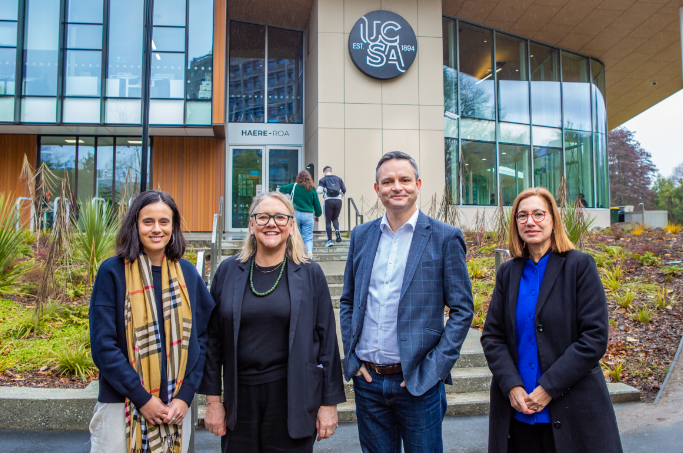The University of Canterbury’s (UC) goal of becoming carbon net neutral by 2030 has received a $6.24 million boost with the announcement of Government funding towards new energy infrastructure at UC’s Ilam campus.


Minister for Climate Change the Hon. James Shaw visited UC today [15 July] to announce the funding, which is part of the Government’s $200m State Sector Decarbonisation Funding (SSDF) project. He was welcomed by UC’s Vice-Chancellor Professor Cheryl de la Rey, Chancellor Sue McCormack, University of Canterbury Student Association President Tori McNoe and the team behind UC’s Low Carbon Energy Strategy (LCES).
“We are delighted with this outcome, which is another important step towards our sustainability goals,” Professor De la Rey says. “With this fund the public sector can reduce carbon emissions and lead the way in steering Aotearoa New Zealand towards a cleaner, more sustainable future.”
UC’s application was supported by Energy Efficiency and Conservation Authority (EECA), which has been working with the university since 2009 providing funding for audits, design advice and feasibility studies to improve energy efficiency and reduce carbon emissions, most recently supporting the LCES roadmap strategy for creating a more sustainable campus.
The $6.24m funding covers a large amount of the cost of a new $15.6m biomass boiler at the Ilam Campus.
The biomass boiler will replace two coal boilers by March 2022, and will run on waste-wood from renewable plantations. Installing biomass boilers will result in an immediate reduction of coal emissions at the Ilam campus from 11,000 tonnes annually to 2,200 tonnes annually – an 80% reduction.
New buildings at UC – such as the University of Canterbury Student Association’s Haere-roa and a 504-bed accommodation block under construction Tupuānuku – are designed with high thermal insulation to use sustainable Ground Source Heat Pump (GSHP) technology, which draws up the natural warmth of the earth to heat large spaces.
Older legacy buildings on Ilam campus present a challenge as they do not have the high thermal specifications required for GSHP. The biomass boiler will provide heat to the campus in the interim and after all the buildings are thermally upgraded, the campus will move away from combustion heating to GSHP or HP, which is scheduled to happen within the next 10 to 12 years.
For further information please contact: UC Communications team







































